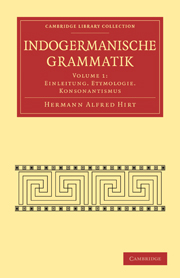Book contents
- Frontmatter
- Vorwort
- Contents
- Literaturangaben
- Verzeichnis der Abkürzungen
- Einleitung
- Erster Teil. Etymologie
- XI. Kapitel Die Lautlehre
- XII. Kapitel Grundgesetze der etymologischen Forschung
- XIII. Kapitel Die Bedeutung der Wörter
- XIV. Kapitel Verwandte und entlehnte Wörter
- XV. Kapitel Verlust von Worten
- XVI. Kapitel Etymologie und Kulturgeschichte
- Zweiter Teil. Der idg. Konsonantismus
- XVII. Kapitel Die Sonorlaute
- XVIII. Kapitel Die Zischlante
- XIX. Kapitel Idg. j und w
- XX. Kapitel Die idg. Tenues und Mediä
- XXI. Kapitel Die idg. Mediä aspiratä
- XXII. Kapitel Die Lautverschiebung
- XXIII. Kapitel Das Hauchdissimilationsgesetz im Griechischen und Indischen
- XXIV. Kapitel Die Gutturalreihen
- XXV. Kapitel Die Tenues aspiratä
- XXVI. Kapitel Sonstige Laute des Idg
- XXVII. Kapitel Konsonantenverbindungen
- XXVIII. Kapitel Die r-Verbindungen
- XXIX. Kapitel Die l-Verbindungen
- XXX. Kapitel Die n-Verbindungen
- XXXI. Kapitel Die m-Verbindungen
- XXXII. Kapitel Die w-Verbindungen
- XXXIII. Kapitel Die j-Verbindungen
- XXXIV. Kapitel Die s-Verbindungen
- XXXV. Kapitel Veränderungen des Konsonantenstandes im Idg. Schwund von Konsonanten
- XXXVI. Kapitel Konsonantenwechsel
- XXXVII. Kapitel Auslautsgesetze
- XXXVIII. Kapitel Der Anlaut
- Autorenverzeichnis
- Sachverzeichnis
- Wörterverzeichnis
XXVI. Kapitel - Sonstige Laute des Idg
Published online by Cambridge University Press: 05 August 2011
- Frontmatter
- Vorwort
- Contents
- Literaturangaben
- Verzeichnis der Abkürzungen
- Einleitung
- Erster Teil. Etymologie
- XI. Kapitel Die Lautlehre
- XII. Kapitel Grundgesetze der etymologischen Forschung
- XIII. Kapitel Die Bedeutung der Wörter
- XIV. Kapitel Verwandte und entlehnte Wörter
- XV. Kapitel Verlust von Worten
- XVI. Kapitel Etymologie und Kulturgeschichte
- Zweiter Teil. Der idg. Konsonantismus
- XVII. Kapitel Die Sonorlaute
- XVIII. Kapitel Die Zischlante
- XIX. Kapitel Idg. j und w
- XX. Kapitel Die idg. Tenues und Mediä
- XXI. Kapitel Die idg. Mediä aspiratä
- XXII. Kapitel Die Lautverschiebung
- XXIII. Kapitel Das Hauchdissimilationsgesetz im Griechischen und Indischen
- XXIV. Kapitel Die Gutturalreihen
- XXV. Kapitel Die Tenues aspiratä
- XXVI. Kapitel Sonstige Laute des Idg
- XXVII. Kapitel Konsonantenverbindungen
- XXVIII. Kapitel Die r-Verbindungen
- XXIX. Kapitel Die l-Verbindungen
- XXX. Kapitel Die n-Verbindungen
- XXXI. Kapitel Die m-Verbindungen
- XXXII. Kapitel Die w-Verbindungen
- XXXIII. Kapitel Die j-Verbindungen
- XXXIV. Kapitel Die s-Verbindungen
- XXXV. Kapitel Veränderungen des Konsonantenstandes im Idg. Schwund von Konsonanten
- XXXVI. Kapitel Konsonantenwechsel
- XXXVII. Kapitel Auslautsgesetze
- XXXVIII. Kapitel Der Anlaut
- Autorenverzeichnis
- Sachverzeichnis
- Wörterverzeichnis
Summary
Möglichkeit andrer Laute. Es kann natürlich in der verflossenen Zeit einer Sprache Laute gegeben haben, die später verloren gegangen sind. So haben z. B. die Römer einst ein χ besessen, das zu h wurde und weiter ganz verstummte. Oder das Oberdeutsche muß doch einmal stimmhaite Medien gehabt haben. Sie sind jetzt verschwunden. Schon bei der Besprechung der Mediäaspiratä erhob sich ein Zweifel, ob wir sie richtig für das Indogermanische ansetzen. Der Weg nun zu neuen, bisher unbekannten idg. Lauten gent von den ≪Ausnahmen≫ der Lautgesetze aus. Finden wir eine Reihe von Worten, die anscheinend eins sind, bei denen aber die Lautvertretung Schwierigkeiten macht, so kommen wir schließlich, wenn es sonst keine Erklärung gibt, auf einen neuen Laut. Es steht natürlich nicht immer gleich sicher mit ihnen, und mancher Laut, den man früher angenommen hat, ist achon wieder beseitigt.
1. Idg.j. Neben den idg. j, s. § 181, schien noch der Ansatz eines andern Lautes nötig zu sein, weil im Griechischen dem j der übrigen Sprachen teils ein h (‘), teils ein Z entspricht.
Die Fälle mit gr. ‘= idg. j sind oben § 181 angeführt, daneben stehen aber:
gr. Ζειά ‘Spelt’, hom, Ζείόωρος άρονρα ‘die Frucht tragende Erde’ : ai. jávas, lit. javaī ‘Getreide’;
gr. Ζεύνυμι, Ζεγος Ζυγν ‘Joch’, 1. jungo, jugum, got. juk, lit. jùng'u ‘binde’, abg. igo ‘Joch’, ai. jugám ‘Joch’; […]
- Type
- Chapter
- Information
- Indogermanische Grammatik , pp. 246 - 253Publisher: Cambridge University PressPrint publication year: 2009First published in: 1927



